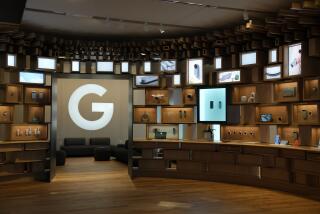Lee Admitted Passing Nuclear Secrets, Boss Says
- Share via
ALBUQUERQUE — A Los Alamos computer scientist accused of compromising American nuclear secrets told a supervisor before he was fired that he “may have accidentally” passed information to a foreign country, a lab official testified Tuesday.
Richard Krajcik, deputy director of Los Alamos National Laboratory’s nuclear weapon division, testified that Wen Ho Lee visited him in his office after taking a polygraph test in February.
“He indicated that he did not intentionally pass on information to a foreign country,” Krajcik said. “He said he may have accidentally passed on information to a foreign country.”
Krajcik’s testimony came on the second day of a hearing on Lee’s request that a federal judge overturn a magistrate’s earlier ruling and release him on bail until his trial, which may be more than a year away. U.S. District Judge James A. Parker was expected to decide whether to grant bail later in the week.
Krajcik said the polygraph questioning involved the W-88, the United States’ smallest and most sophisticated nuclear warhead. Krajcik didn’t give the exact date of the February test and didn’t say whether Lee had identified the country that may have received the information.
He said the two questions Lee failed were whether he had passed information to a foreign country and whether he had passed along classified codes to a foreign country.
Krajcik also said that he was present when Lee, a naturalized U.S. citizen who was born in Taiwan, was interviewed by the FBI on March 5 and that he appeared “deceptive and evasive.” Lee was fired March 8.
“My reaction was that Mr. Lee was not being candid and truthful in his response to the questions,” Krajcik said.
On cross-examination, Lee attorney Mark Holscher of Los Angeles asked Krajcik whether it was possible that when Lee said he may have passed on information, he was referring to articles he had written that had been approved by the lab.
“That did not appear to me to be the issue,” Krajcik replied. “We did not talk about publications or publication records.”
Holscher also introduced into evidence a December 1998 polygraph test with questions that were similar to those asked during the February polygraph. Holscher did not say at whose request the test was administered, but he said it was examined by three experts and received “one of the highest scores you can get on a polygraph test.”
The judge asked Krajcik whether Lee could be released under numerous restrictions, including electronic monitoring, 24-hour FBI surveillance, limited visitation and the removal of all communication devices from his home, except for a monitored telephone.
Krajcik told the judge there would still be ways for Lee to communicate with other people, notably through a third party, such as his wife.
Paul Robinson, president of Sandia National Laboratories in Albuquerque, which does nuclear weapon research and development, also urged caution.
A Los Alamos computer security expert testified Monday that Lee transmitted unclassified information to foreign countries that revealed two lab computer logins and passwords that could be viewed by any computer hacker.
Lee has pleaded not guilty to the 59 counts against him. If convicted, he could be sentenced to life in prison. He has sued the government, claiming he has been the victim of a smear campaign.
He is accused of transferring classified material from secure to unsecure computers and to computer tapes, seven of which are missing. The defense contends the tapes were destroyed.
More to Read
Sign up for Essential California
The most important California stories and recommendations in your inbox every morning.
You may occasionally receive promotional content from the Los Angeles Times.













